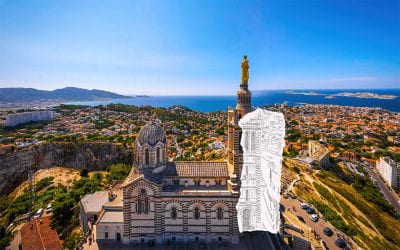School of Pop/Rock
Arts and Cultureby Nadine Gomes
The Roosevelt Review interviewed Nadine Gomes, teaching professor of musical theatre, about her experience in the Equity Teaching Academy.
When I was a student, all classes looked the same. Someone lectured from the front of the room, you took notes, you read books and you wrote papers. That was the model. But we don’t have to teach the way that we were taught.
I joined the Equity Teaching Academy (ETA) because I see Roosevelt as the social justice school, and I wanted to bring more of that into the classroom. The experience reinvigorated my teaching practice.
The focus of the Equity Teaching Academy this year was ensuring student success. We each picked one course to revamp. We met faculty members from other colleges in breakout rooms — even in vastly different disciplines, we found a lot of commonality in our goals. It was very stimulating to talk about teaching with other faculty who care and are trying to grow, learn and change.
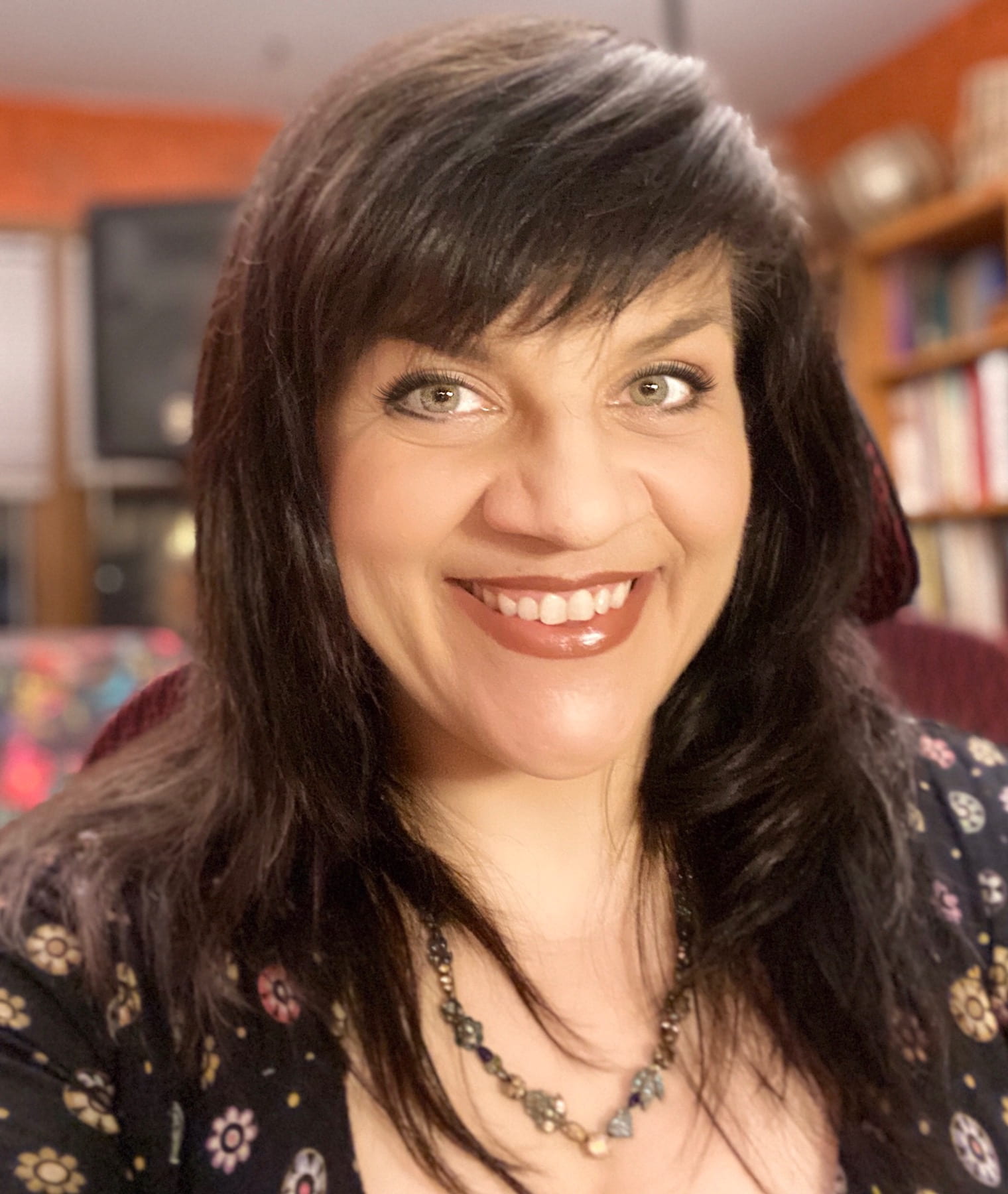
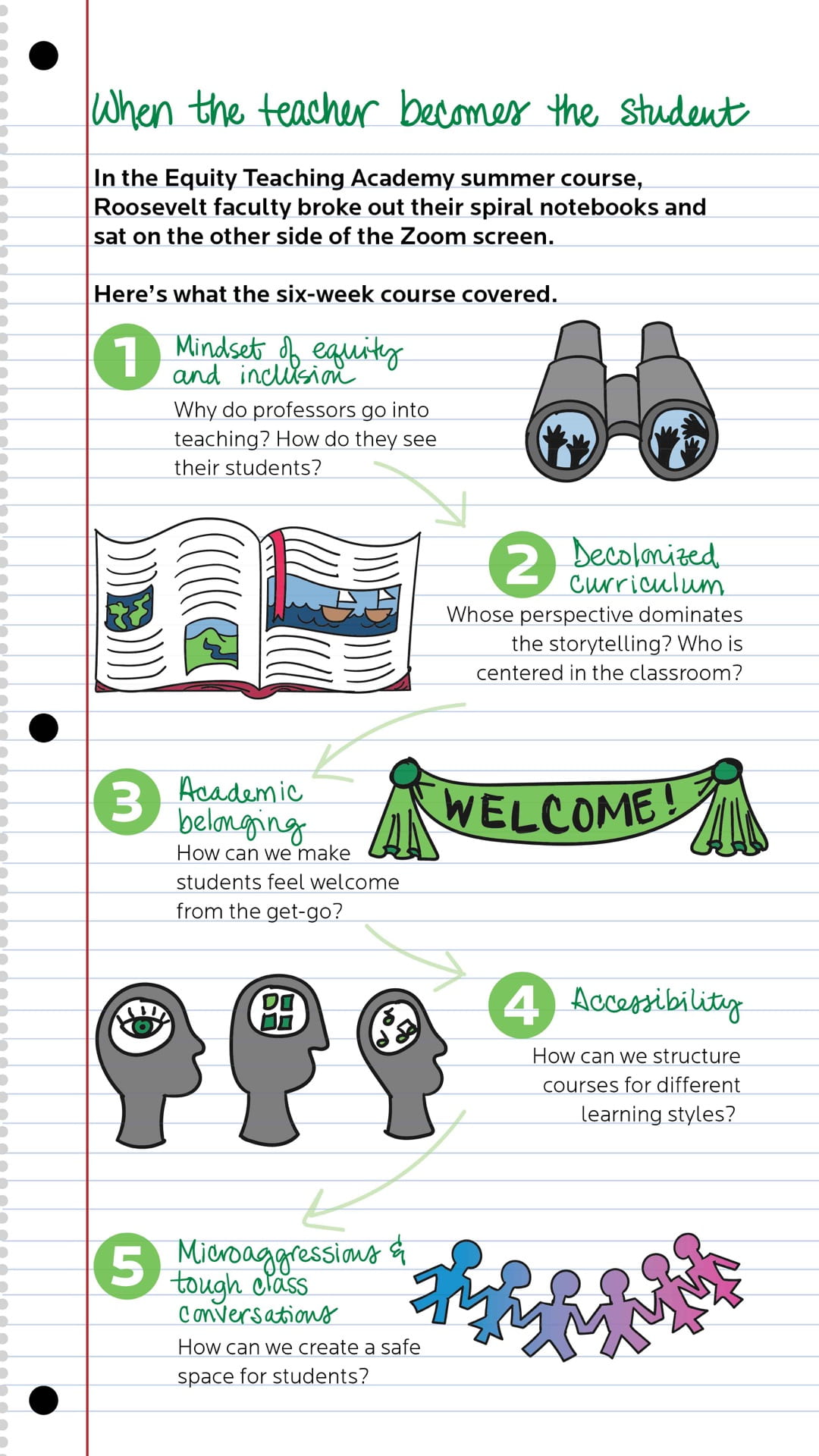
Academic belonging starts in your syllabus. Through the ETA, I created something called a liquid syllabus — an easy-to-access, mobile-friendly website that students could even read on the L. I started with a brief overview video, a DEI statement and a welcoming, personable faculty bio.
Students can find everything they need for class — assignments with estimated read times, Spotify playlists, health and well-being resources — in one place.
The Equity Teaching Academy taught us about Universal Design for Learning, which involves offering variable content and variable ways to complete assignments. Universal Design Learning is not asking students to do less — you curate what students are listening to or watching so each piece of material is valuable.
To prepare for our lesson on cultural appropriation, I gave students a choice of articles, podcasts and videos and explained what to do to prepare for our discussion. Everyone could share what they learned, but students also came at the conversation from different viewpoints.
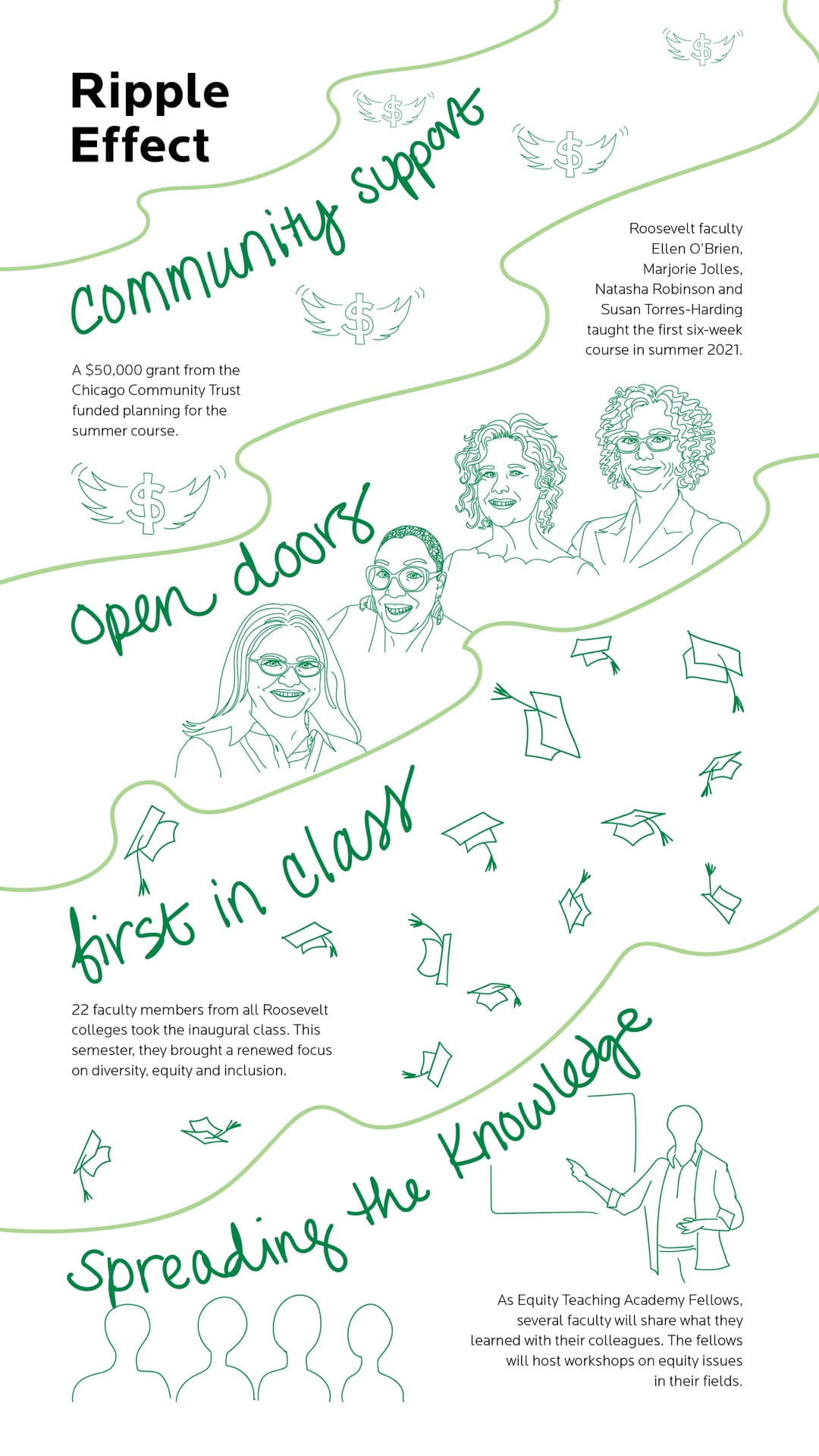
Pop/Rock and Social Change
I started teaching the course Pop/Rock Styles in Musical Theatre last fall. Pop/rock musicals used to be written by Andrew Lloyd Webber, and now they’re being written by singers like Sting, Sarah Bareilles and Elton John.
In auditions, casting directors want to hear actual pop/rock music. You have to be a trained singer, but you have to get that flavor in your voice and understand the music.
Pop/rock swims in the waters of revolution and social change. People have fought against societal norms from the blues through to now. The course is a performance class, but it’s also important that students understand popular music history.
When you’re singing pop/rock, you have to address cultural appropriation. Much of music is built on Black music, and a lot of Black artists have been forgotten because their music was covered by white artists. I don’t think you can sing this music without understanding that history.
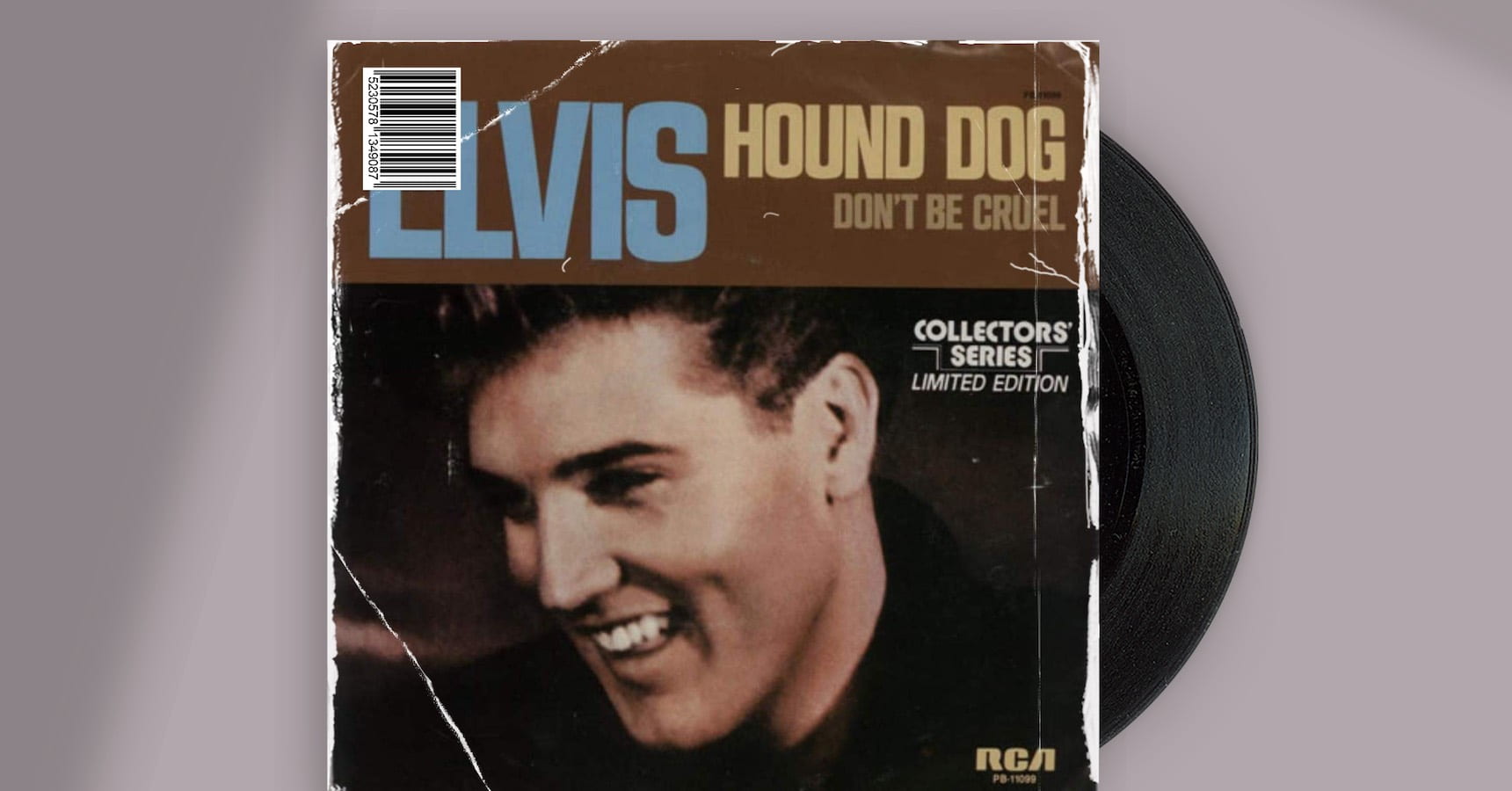
Elvis Presley has been accused of cultural appropriation as a white artist covering Black artists. Simultaneously, some people were branding him as “too feminine” during his career because of his hips, hair and glamour. In Nadine Gomes’ class, students explore the nuances of cultural appropriation and gender-bending.
In my course, we discuss the nuance in what’s a cover and what’s appropriation. We talked about cancel culture, and if it’s possible to separate the artist from the art. We also discussed how our relationship with these artists might change and evolve.
The Equity Teaching Academy was the perfect class to figure out how to approach these social justice issues.
Contemporary white artists certainly appropriate other cultures in what they wear, what they sing or how they portray themselves. My students don’t want to offend anyone or make an inauthentic musical choice, but they still want to sing a variety of genres. How do you appreciate the genre and honor those who came before you?
Pop music doesn’t obey the gender binary. Those traditions go back further than many of our students know. When students are singing pop/rock music, they can gender-bend to their heart’s content. You can make it your own.
Making students feel like they belong
Instead of asking if students are college-ready, maybe we should ask if colleges are student-ready. Students need to feel like they’re in the right place, that the classroom is for them. And it’s our responsibility to help them feel like that.
A lot of students come in thinking, I’m not enough, I don’t belong here, for any number of reasons. As faculty, we need to erase those barriers. If students feel welcome and feel that you care about them, they’re more likely to seek out help when they need it. And that leads to more academic success.
I encourage Roosevelt faculty to sign up for ETA this coming summer, or any future offerings. I found it to be a truly transformational learning experience, and it has already had a profound impact on my teaching.
More in this section
unexcused absence
Some of life’s most important lessons cannot be taught inside the four walls of a classroom. Matthew Beardmore’s travel has forced him to reassess how he thinks about work, family, politics, injustice and many other issues. He’s no longer tied to the beliefs of where he grew up.
traveling while home: self-discovery through the local
How can you make the long trip home if you don’t actually leave there? A partnership between Roosevelt University’s Honors Program and Chicago Architecture Center asks students to experience space and place as sites for action—not simply places we passively inhabit.
creating a new travel niche while wandering the globe
In early 2011, Sahara Rose De Vore bought a one-way ticket to Costa Rica. Over the next 10 years, she explored 84 countries. The self-discovery she experienced inspired her to launch two successful businesses—both helping others discover the benefits of travel.

